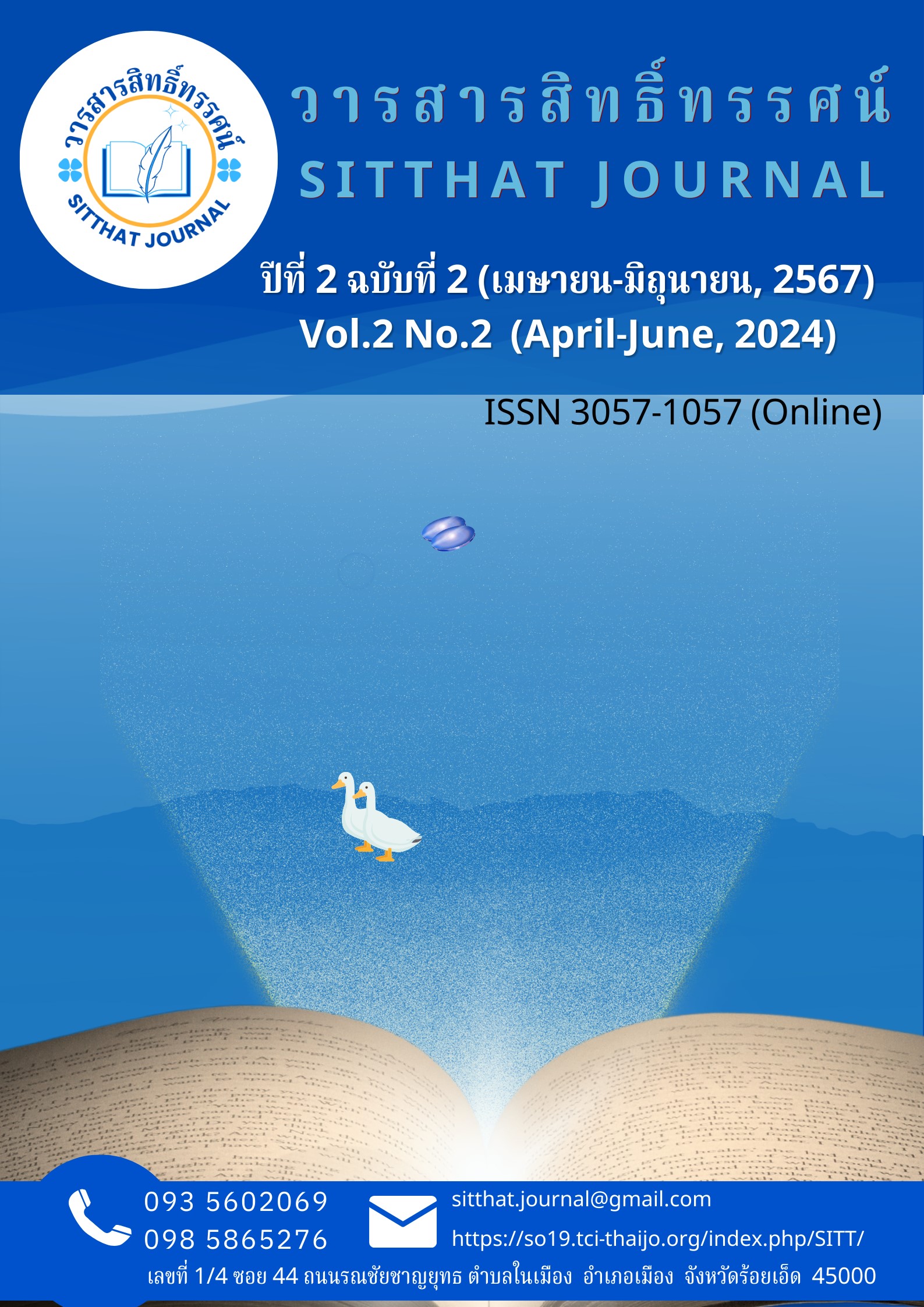PERFORMANCE ACTORS ACCORDING TO THE THREEFOLD PRINCIPLES OF NONG HANSUBDISTRICT MUNICIPALITY PERSONNEL NONG HAN DISTRICT, UDON THANI PROVINCE
Main Article Content
Abstract
The objectives of this research were (1) to study the work performance according to the Threefold Principle of personnel, (2) to study the factors of work performance according to the Threefold Principle of personnel, and (3) to study the guidelines for developing work performance according to the Threefold Principle of the personnel of the sub-district municipality. Nong Han, Nong Han District, Udon Thani Province it is both quantitative and qualitative research. The sample group consisted of 359 personnel and people aged 18 years and over in the Nong Han Subdistrict Municipality, Nong Han District, Udon Thani Province And the target group includes executives, department heads, and community leaders in the Nong Han Subdistrict Municipality, Nong Han District, Udon Thani Province, totaling 10 people. It is a quantitative research and qualitative research Statistics using frequency distribution statistics and percentage of respondents Analyzed by presenting in tables using mean statistics and standard deviation multiple regression analysis using sequential variable selection method. Accompanying the discussion of results Data analysis and descriptive analysis the results of the research found that: (1) Personnel's work according to the Threefold Principles Overall, it is at a moderate level. They can be arranged in descending order as follows: In terms of working according to the plan Job analysis work planning and work evaluation, respectively (2) Factors in the performance of personnel according to the Threefold Principles Statistically significant at the .05 level are operational process factors (X1), development process factors (X2), and social environment process factors (X4). The coefficient of the predictor in the raw score (b) is equal to .670. .037 And .031 respectively and (3) it is necessary for the administration to recognize the importance of promoting and supporting the performance of duties more than ever before. Regularly go to the area to inspect and ask people's opinions more than before. Pay attention to listening to opinions from the people in their daily lives. Personnel should inspect to find defects and then improve and correct them. Public electricity provides thorough lighting. Service is another important factor. Personnel need to have good human relations Take care of the service be humble. Be gentle with people who come to contact government officials. Serve the public with speed and accuracy. That agency or organization That is, public service work must be performed with transparency. Honest Based on moral principles in working for fairness, straightness, no cheating of maximum benefit to the people and the efficiency of personnel in the organization effectively.
Article Details

This work is licensed under a Creative Commons Attribution-NonCommercial-NoDerivatives 4.0 International License.
บทความนี้
References
กัลยา วานิชย์บัญชา.(2560). การวิเคราะห์สถิติชั้นสูงด้วย SPSS for Window (พิมพ์ครั้งที่ 12). กรุงเทพฯ:
ห้างหุ้นส่วนจํากัด สามลดา.
โกวิทย์ พวงงาม. (2550). การปกครองท้องถิ่นไทย. กรุงเทพฯ: บริษทสำนักพิมพ์วิญญูชน. จำกัด.
โกวิทย์ พวงงาม. (2552). การปกครองท้องถิ่นไทย หลักการและมิติใหม่ในอนาคต. กรุงเทพฯ : โรงพิมพ์
เดือนตุลา.
โกวิทย์ พวงงาม.. (2554). การปกครองท้องถิ่น: ว่าด้วยทฤษฎี แนวคิดและหลักการ. กรุงเทพฯ:
เอ็กซเปอร์เน็ท.
เดชชาติ ตรีทรัพย์, พระครูปัญญาธีรธรรม (ศรีแก้ว), บัญญัติ แพรกปาน. (2559). การนำหลักไตรสิกขามาใช้
ในชีวิตประจำวันของประชาชนเทศบาลตำบลไม้เรียง อำเภอฉวาง จังหวัดนครศรีธรรมราช. วารสาร
มหาจุฬานาครทรรศน์, 3(2), 14 – 26.
พระทิพยรส ตนฺติปาโล (ศรีสุข), วรภูริ มูลสิน, พระครูปริยัติปัญญาโสภณ. (2567). การประยุกต์ใช้หลัก
ไตรสิกขาในการพัฒนาคุณภาพชีวิตผู้สูงอายุขององค์การบริหารส่วนตําบลเกาะแก้ว อําเภอสําโรง
ทาบ จังหวัดสุรินทร์. วารสารวนัมฎองแหรกพุทธศาสตรปริทรรศน์, 11(1), 165 – 178.
พระสมุห์หลง อิทฺธิญาโณ และคณะ. (2566). การประยุกต์หลักไตรสิกขาเพื่อการพัฒนาทรัพยากรมนุษย์ของ
องค์การบริหารส่วนตำบลปางหมู อำเภอเมืองแม่ฮ่องสอน จังหวัดแม่ฮ่องสอน. Journal of
Buddhist Innovation and Management, 6(5), 1 – 13.
พระพรหมคุณาภรณ์ (ป.อ. ปยุตฺโต). (2553). พจนานุกรมพุทธศาสตร์ฉบับประมวลธรรม, พิมพ์ครั้งที่ 17.
กรุงเทพฯ : โรงพิมพ์มหาจุฬาลงกรณราชวิทยาลัย.
เรืองวิทย์ เกษสุวรรณ. (2555). แนวคิดทฤษฎีการปกครองส่วนท้องถิ่น. กรุงเทพฯ: บพิธการพิมพ์จำกัด.
วุฒิสาร ตันไชย. (2557). การกระจายอำนาจและประชาธิปไตยในประเทศไทย. (พิมพ์ครั้งที่ 1). กรุงเทพฯ:
สถาบันพระปกเกล้า.
Yamane, Taro. (1973). Statistics an introductory analysis. New York Harper & Row.


